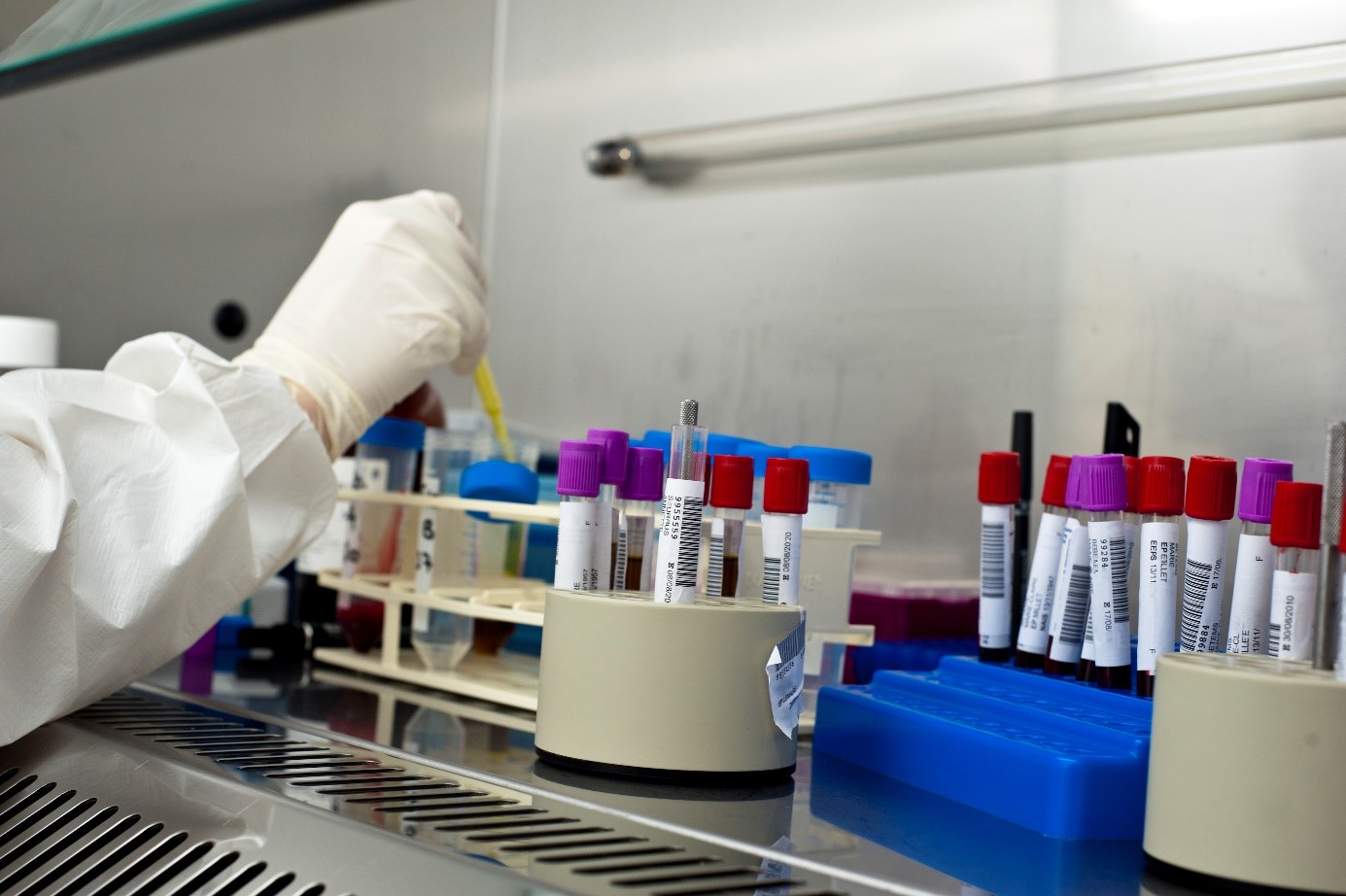Researcher Contact
Fawaz Alzaid
Centre de Recherche des Cordeliers
E-mail : moc.liamg@diazla.zawaf
Téléphone portable sur demande

Researchers have identified biomarkers in blood samples taken from diabetic patients. © Inserm/Latron, Patrice
Type 2 diabetes is a risk factor for the development of a severe form of Covid-19. Identifying the immune- and inflammatory markers associated with these severe forms of the disease in this patient population would enable earlier and more appropriate care. Researchers from Inserm, the Paris hospitals group AP-HP and Université de Paris have identified an immune signature in hospitalized diabetic patients that would make it possible to predict the risk of admission to intensive care. Their findings have been published in EMBO Molecular Medicine and supplement those of other studies published in recent months on the identification of biomarkers predictive of severe forms of Covid-19.
In the early months of the Covid-19 pandemic, type 2 diabetes was identified as a risk factor for developing a severe form of the disease and has been linked to higher mortality. Therefore, understanding why this is and identifying biomarkers to predict which diabetic patients will progress to a severe form of Covid-19 requiring intensive care constitutes a research priority in order to improve their care and increase their chances of survival.
As part of the team led by Inserm Research Director Nicolas Venteclef at Cordeliers Research Center (Inserm/Université de Paris/Sorbonne Université), researchers Fawaz Alzaid and Jean-Baptiste Julla prepared an observational study in a hospital setting. It was conducted at the University Center for the Study of Diabetes and its Complications led by Jean-François Gautier, a diabetologist researcher at Lariboisière Hospital AP-HP. The objective was to better understand the link between pre-existing inflammation in diabetes and the risk of developing a severe form of Covid-19. The scientists sought to characterize the immune and inflammatory “signatures” of diabetic patients hospitalized following infection with SARS-CoV-2 and who presented severe symptoms of the disease.
They looked at the immune response of 45 patients hospitalized with Covid-19, thirty of whom had type 2 diabetes. Among the study participants, 35% of the diabetic patients developed a severe form of the disease requiring a stay in intensive care, compared to 25% of the non-diabetic hospitalized patients.
The researchers analyzed blood samples from all of the patients. They found that those most severely affected had fewer lymphocytes (a type of white blood cell) than those who had not been in intensive care. The team observed particularly low levels of cytotoxic CD8+ lymphocytes, immune cells particularly involved in the antiviral response with important functions of recognizing and eliminating infected cells. This was observed in all of the intensive care patients, regardless of diabetic status.
However, the diabetic patients having required intensive care differed from non-diabetic patients in the same case because they also had fewer monocytes (another type of white blood cell) in their blood. Changes in the morphology of these monocytes were also observed, as these immune cells in patients with type 2 diabetes had a larger average size than those found in blood samples from non-diabetic patients.
Finally, the researchers noted an increased presence of inflammatory markers associated with the type 1 interferon pathway, powerful antiviral molecules.
“These findings have major clinical implications as they suggest that there is an immune- and inflammatory signature specific to diabetic patients at risk of developing severe Covid-19. If physicians notice a decrease in monocyte frequency and a change in their morphology, they have the possibility to identify patients who will require further follow-up and potentially a place in intensive care. This will make it possible to refine and improve care,” explains Inserm researcher Fawaz Alzaid.
This research also provides data to support ongoing clinical studies that suggest the importance of a disruption of the type 1 interferon pathway in the development of severe forms of the disease, and the potential therapeutic value of anti-interferon drugs, already highlighted in recent research involving Inserm, published in Science.
Fawaz Alzaid
Centre de Recherche des Cordeliers
E-mail : moc.liamg@diazla.zawaf
Téléphone portable sur demande
Monocytopenia, monocyte morphological anomalies and hyperinflammation characterise severe COVID‐19 in type 2 diabetes
Fawaz Alzaid *,1,‡, Jean‐Baptiste Julla1,2,‡, Marc Diedisheim1,3, Charline Potier1, Louis Potier1,4, Gilberto Velho1, Bénédicte Gaborit5, Philippe Manivet6,7, Stéphane Germain8, Tiphaine Vidal‐Trecan2, Ronan Roussel1,4, Jean‐Pierre Riveline1,2, Elise Dalmas1, Nicolas Venteclef1 et Jean‐François Gautier *,1,2
1 Cordeliers Research Centre, INSERM, IMMEDIAB Laboratory, Sorbonne Université, Université de Paris, Paris, France
2 Department of Diabetes, Clinical Investigation Centre (CIC‐9504), Lariboisière Hospital, Assistance Publique – Hôpitaux de Paris, Paris, France
3 Department of Diabetology, Cochin Hospital, Assistance Publique Hôpitaux de Paris, Université de Paris, Paris, France
4 Department of Diabetology, Endocrinology and Nutrition, Bichat Hospital, Assistance Publique ‐ Hôpitaux de Paris, Paris, France
5 INSERM, INRA, Aix Marseille University, C2VN, Marseille, France
6 Endocrinology, Metabolic Diseases and Nutrition Department, Assistance Publique Hôpitaux de Marseille, Marseille, France
7 Centre de Ressources Biologique “biobank Lariboisière”, BB‐0033-00064, APHP, Nord, Université de Paris, Paris Diderot, Hôpital Lariboisière, Paris, France
8 Center for Interdisciplinary Research in Biology (CIRB), College de France – Centre National de la Recherche Scientifique (CNRS), Institut National de la Santé et de la Recherche Médicale (INSERM), Paris Sciences et Lettres (PSL) Research University, Paris, France
EMBO Molecular Medicine, septembre 2020